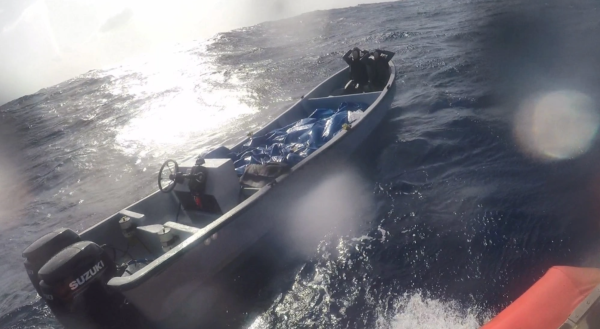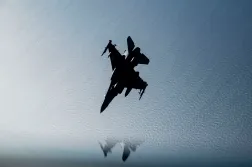Houthis deploy unmanned kamikaze boat amid Operation Prosperity Guardian

For the first time since the Pentagon launched Operation Prosperity Guardian to counter intensifying Houthi-led attacks on commercial vessels in the Red Sea, the Iran-backed rebel group on Thursday sent a maritime drone on a kamikaze mission into international shipping lanes on that crucial trade route, according to a senior military officer.
“Fortunately there were no casualties and no ships were hit” when that unmanned surface vessel exploded after transiting about 50 miles into the Red Sea shipping lanes, Vice Adm. Brad Cooper, commander of U.S. Naval Forces Central Command, told reporters on a call shortly after the incident. “But the introduction of a one-way attack USV is a concern” for all involved in the OPG initiative, he added.
Defense Secretary Lloyd Austin unveiled Prosperity Guardian in mid-December, in response to a series of drone and missile assaults against commercial ships transiting the Red Sea that were launched from parts of Yemen that the Pentagon assesses is controlled by the Houthis. This flare-up of attacks against merchant vessels emerged in October following the start of Israel’s war against the Palestine-based militant group Hamas.
Cooper briefed reporters Thursday on the latest details regarding this multinational operation, which he and other officials have repeatedly emphasized is “entirely defensive in nature.”
Although countries contributing to the effort continue to warn the Houthis about potential retaliation for these attacks should they continue, “there are no signs that their irresponsible behavior is abating,” he noted.
Roughly 1,500 commercial vessels have safely sailed in the Red Sea since OPG kicked off, according to Cooper, and the nations participating have been able to significantly boost their engagement with the global shipping industry.
“Since the operation started, together with our partners, we have shot down 19 [aerial] drones and missiles and sunk three small boats,” he said.
In recent years, the Houthis have deployed kamikazee maritime drones to ambush ships in Middle East waters. But Cooper confirmed that this incident Thursday marked the first time the rebel group unleashed a one-way attack USV in the Red Sea during Operation Prosperity Guardian.
“I won’t go into all the operational specifics, but all the attacks that the Houthis had on shipping all happen out in the dense maritime shipping lanes. The USV was also in the dense lanes and came within a couple of miles of ships operating there — merchant ships and U.S. Navy ships — and we all watched as it exploded. No more details on that for right now,” Cooper told reporters.
A senior defense official, who spoke to DefenseScoop after the call Thursday on the condition of anonymity, noted that this latest event involving the detonation of a maritime drone is “bringing to light an additional layer of technological complexity” from the Houthis that officials steering Prosperity Guardian will need to confront moving forward.
“It’s an indication of either emerging or re-identified capabilities. It also further signals that the Houthis are attempting to extend their range with USVs into the sea lines of communication,” the official told DefenseScoop.
As perhaps an indication of a much broader, longer-term need to defend against these types of platforms, the U.S. Navy on Wednesday issued a special notice on Sam.gov to inform vendors about an upcoming request for solutions that will seek “innovative proposals for addressing the challenge of countering multiple cross-domain” uncrewed systems that can be used for coordinated attacks.






